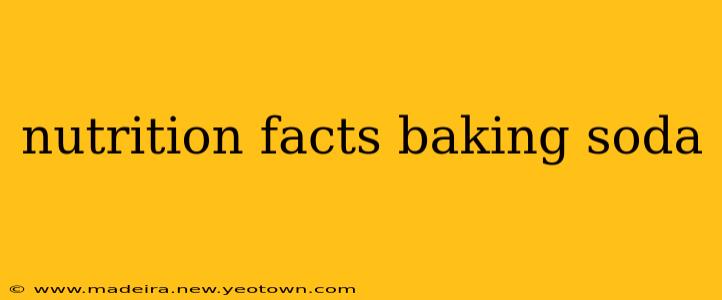Baking soda. That humble white powder sitting quietly in your pantry. It's the leavening agent that makes your cakes rise, the deodorizer that banishes fridge smells, and… a nutritional powerhouse? Well, maybe not in the same league as kale, but baking soda does have some interesting properties, and understanding its nutritional facts (or lack thereof) can be surprisingly enlightening. Let's dive in.
What are the Nutritional Facts of Baking Soda?
The short answer is: there aren't many. Baking soda, chemically known as sodium bicarbonate, is primarily sodium bicarbonate. A one-teaspoon serving (about 5 grams) provides roughly 1,800mg of sodium and negligible amounts of other nutrients. That's a significant portion of the recommended daily sodium intake for many adults, which is why it's important to use baking soda sparingly.
Is Baking Soda Good for You?
This is where things get a bit more nuanced. While baking soda itself doesn't offer a wealth of vitamins or minerals, its sodium content can contribute to some health benefits, albeit indirectly and in limited contexts.
Does Baking Soda Have Any Health Benefits?
Some people use baking soda for its potential health benefits, often as a home remedy. These uses are not medically endorsed in all cases, and it's crucial to consult with a healthcare professional before using baking soda for any medical purpose.
Note: While there are anecdotal reports and some studies on certain applications, more research is needed to confirm the effectiveness and safety of these practices for most conditions. It's always best to seek advice from a doctor or registered dietitian before using baking soda for anything other than its intended culinary purposes.
Can Baking Soda Help with Acid Reflux?
Some people use baking soda to neutralize stomach acid in cases of heartburn or acid reflux. The bicarbonate in baking soda reacts with stomach acid, providing temporary relief. However, it's important to use it sparingly and under medical guidance, as excessive use can lead to an imbalance of electrolytes and other health problems. This is a temporary fix, and a long-term solution should be discussed with a doctor.
Can Baking Soda Whiten Teeth?
Baking soda's abrasive nature has led some to use it as a teeth whitening agent. While it can temporarily remove surface stains, it can also damage tooth enamel with consistent use. Professional teeth whitening methods are generally recommended over DIY methods.
Does Baking Soda Affect Blood Pressure?
Due to its high sodium content, frequent use of baking soda can potentially exacerbate high blood pressure in susceptible individuals. It's vital to monitor sodium intake and consult a doctor if you have concerns about your blood pressure.
What are the Side Effects of Consuming Baking Soda?
Excessive consumption of baking soda can lead to several adverse effects, including:
- Electrolyte imbalance: This can cause muscle weakness, cramps, and potentially more serious issues.
- High blood pressure: The high sodium content contributes to increased blood pressure in many people.
- Nausea and vomiting: Overconsumption can lead to gastrointestinal distress.
- Kidney problems: In individuals with existing kidney conditions, excessive baking soda intake can place extra strain on the kidneys.
How Much Baking Soda is Safe to Consume?
There's no officially recommended daily allowance for baking soda consumption, as it's not a nutrient. The amount used in cooking and baking is generally safe, but exceeding this amount, especially for therapeutic purposes, should be strictly avoided unless specifically directed by a healthcare professional.
In conclusion, while baking soda lacks significant nutritional value in the traditional sense, it plays a crucial role in cooking and has some potential, albeit limited and often controversial, applications in health and personal care. Always consult with a healthcare professional before using baking soda for anything other than its intended cooking purpose to ensure safe and appropriate usage. Remember, moderation is key!

